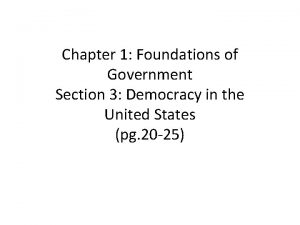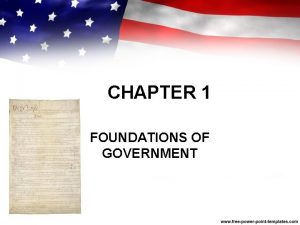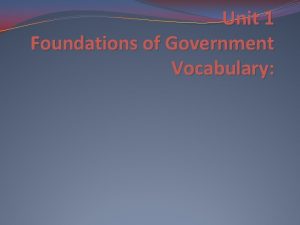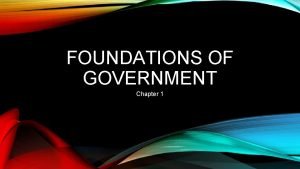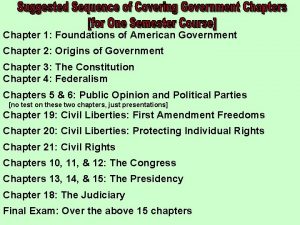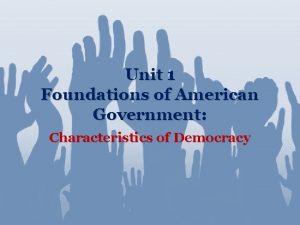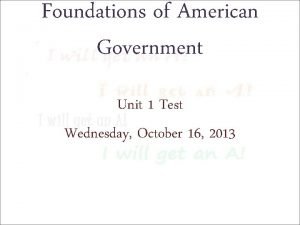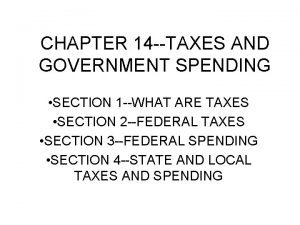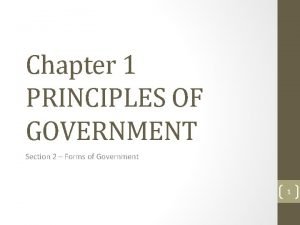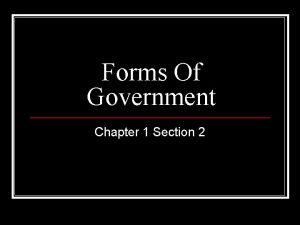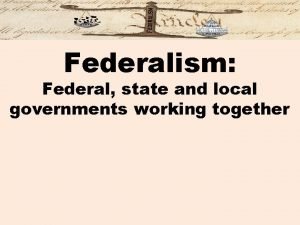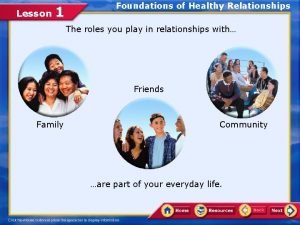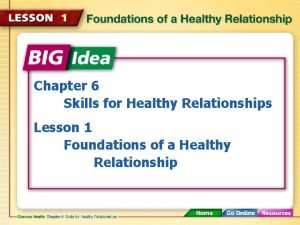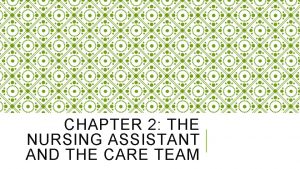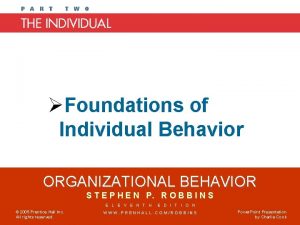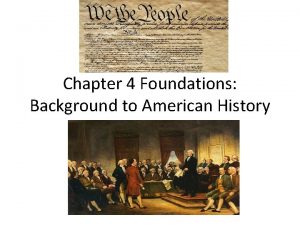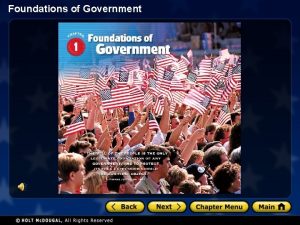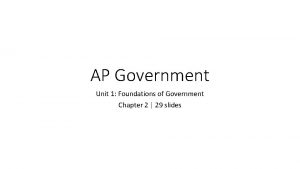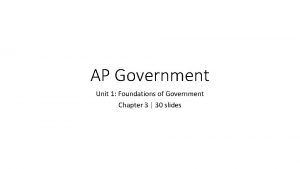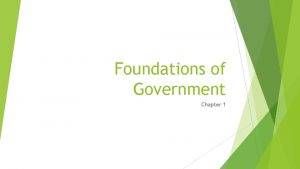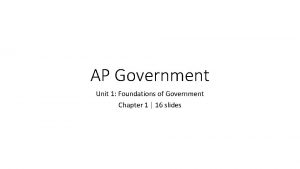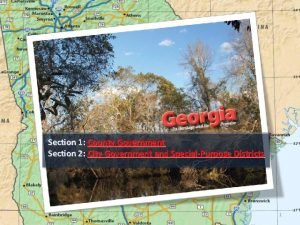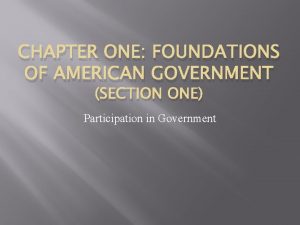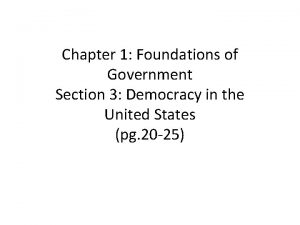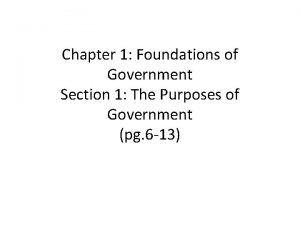FOUNDATIONS OF GOVERNMENT Chapter 1 SECTION 1 THE
















- Slides: 16

FOUNDATIONS OF GOVERNMENT Chapter 1

SECTION 1 – THE PURPOSES OF GOVERNMENT • What is Government? • Why do we need it? • Characteristics of State: a political unit with the power to make and enforce laws over a group of people living within a clearly defined territory. • • Population Territory Government Sovereignty– power; independence;

FUNCTIONS OF GOVERNMENT • Security • Maintain Order • Resolve Conflict • Provide Service • Provide for the Public Good THEORIES OF RULE • Divine Right – ruler chose by God • Natural Law and Natural Rights – rational order and human behavior • Social Contract Theory - Agreeing among yourselves to allow yourself to be governed.

PHILOSOPHERS • Hobbes – Leviathan = “state of nature” without government or laws. • John Locke – government is a product of social contract. Even in a state of nature they are governed by natural laws they consent to. • Limited government – life liberty and property need to be protected from the government • Rousseau – state of nature people were happy and it was government that corrupted human condition and introduced inequality. • The Social Contract (1762) – only solution is a social contract based government that responded to the will of the people.

SECTION 2 – FORMS OF GOVERNMENT

MONARCHY • Inherit the thrown • Supreme authority • Absolute – unlimited and unchecked Autocracy – one person rules

DICTATORSHIP • One person or small group has control • Often violent • Usually authoritarian • Most extreme form is TOTALITARIAN • All aspects of life • Nazi Germany • Oligarchy – rule of few, small group • Often theocracies – religion

DEMOCRACY • “demos” = people • Direct – like in ancient Greece • Republic – aka indirect or representative like the US

UNITARY AND FEDERAL • Unitary governments - uni- means one. • Federal – government is divided and power is shared locally and nationally c

PRESIDENTIAL AND PARLIAMENTARY • One president chosen by the people with a separate legislative branch • Parliamentary systems do not show a division between the executive and legislative branches.

• IDEALS BASIC CONCEPTS OF DEMOCRACY AND PURPOSES OF GOVERNMENT… • Liberty • Equality • Self Governance • • • PRINCIPLES 1. Fundamental worth of the individual – free to live life people can reach their highest potential 2. Rule of Law – limits on power 3. Majority Rule/Minority rights – minority rights are protected against the majority 4. Necessity of Compromise – give up a little and come to an agreement 5. Citizen Participation – self-government requires participation; citizens must be informed • FREE ENTERPRISE – make own economic choices.

DO WE HAVE A DEMOCRACY? • Majoritarian theory • Elitist theory • Pluralist theory • Bureaucratic theory

DISCUSSION QUESTIONS • If citizens are fit to select political leaders, why may they be unfit to govern themselves without such leaders? • What is the difference between power, authority and legitimacy? • What is democracy, and why is democracy alone not sufficient to protect people?

FOOD FOR THOUGHT • U. S. political culture and political socialization help create shared fundamental values including liberty (freedom), equality, private property and order. The dilemma of modern government is to balance freedom, order and equality. • The changing face of America – aging and ethnic changes, family structure and education…what will the impact be on politics?

POLITICAL SPECTRUM

PURPOSE OF GOV’T - PREAMBLE • P. 29 #9 – Read the preamble; What are the purposes of government? Explain each statement. • Chapter 1 Review Ch. 29 #1 -7
 Foundations of government section 3
Foundations of government section 3 Chapter 1: foundations of government
Chapter 1: foundations of government Chapter 1 foundations of government vocabulary
Chapter 1 foundations of government vocabulary Chapter 1: foundations of government pdf
Chapter 1: foundations of government pdf Foundations of government (chapter 1 test form a)
Foundations of government (chapter 1 test form a) Unit 1 foundations of american government
Unit 1 foundations of american government Foundations of american government unit test
Foundations of american government unit test Chapter 14: taxes and government spending section 1
Chapter 14: taxes and government spending section 1 Chapter 1 section 2 forms of government
Chapter 1 section 2 forms of government Chapter 1 section 1 government and the state
Chapter 1 section 1 government and the state Chapter 1 section 2 forms of government
Chapter 1 section 2 forms of government State and federal constitutions
State and federal constitutions Chapter 6 lesson 1 foundations of a healthy relationship
Chapter 6 lesson 1 foundations of a healthy relationship Chapter 6 lesson 1 foundations of a healthy relationship
Chapter 6 lesson 1 foundations of a healthy relationship Chapter 2 foundations of resident care
Chapter 2 foundations of resident care Foundation of individual behavior
Foundation of individual behavior Chapter 4 foundations background to american history
Chapter 4 foundations background to american history
